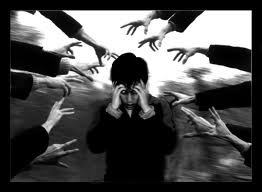Schizophrenia is a medical condition also known as personality disorder. This severe brain disorder causes the person to hallucinate, delude and have a thwarted sense of reality. Generally, it is more common to men than women. The schizophrenia symptoms and treatment varies from each patient. Doctors may use different medical approach and therapies in seeking the most effective treatment.
What is Schizophrenia?
Schizophrenia is mental illness that affects one percent of the population. A serious psychotic mental disorder affects the thinking and behavior of a person. People suffering from schizophrenia are having a hard time in recognizing real from what is not. They develop hallucinations and delusions. Sufferers may even hear unreal voices or see images that are not actually present. They may also have sensations like crawling insects under their skin when they are actually none.
Schizophrenics may also show distant emotions, disorganized speech and disorganized behavior. Part of being disorganized is ideas about themselves that are not true. This may lead to paranoia later on if not properly addressed.
The severity of schizophrenia symptoms and treatment differ from one patient to another. Families and friends of schizophrenic should understand that this is a lifelong disease. The success of the treatment depends not just on medications but also with different kinds of therapies and support groups.
What are the Causes of Schizophrenia?
There is no exact cause for schizophrenia. Like any other mental illness, several factors may contribute to the development of schizophrenia. Studies show that genetic, psychological and even environmental factors play major role in schizophrenia.
Life experiences may tend to play big impact to sufferers too. Violence, physical abandonment, poverty, physical and sexual abuse are just few of the underlying reasons for schizophrenia.
What are Schizophrenia Symptoms?
Schizophrenia symptoms are classified in three categories: the positive symptoms, negative symptoms and cognitive symptoms. Here are the symptoms based on each group.
- Positive symptoms are bizarre behaviors that a healthy person may not do. Those who have positive schizophrenia positive symptoms may exhibit loosing touch with reality. The severity of the symptoms differs whether the patient is under medical treatment. Some of positive symptoms include hallucinations, delusions, thought disorders and movement disorders.
Hallucinations are the first common symptom of schizophrenia. Sufferers may see things, hear voices or feel something that is not for real. They may converse with the voices they hear as if it is really around. Â Hearing voices or talking to oneself may actually be going on for long before the families notice the condition.
Delusional thoughts are often manifested in cases with schizophrenia. They may develop thoughts that their families, friends and even neighbors around are plotting to hurt them through poisoning, harassing, and spying.
Thought disorders are unusual way of thinking. A person may have hard time organizing the thoughts in his mind. May stop speaking in a middle of sentence as they feel that a thought is taken out of their mind.
Movement disorder may appear as repetitive body movements like walking back and forth for no reason at all. However, rare cases like catatonia happen, it is a state where a person just stops moving without responding.
- Negative symptoms are characterized as disruptions of normal behaviors and emotions. These symptoms are similar to depression.
Some of negative symptoms are loss of pleasure in everyday life and showing flat effect. Flat affect takes place when a person move and speaks in dull and monotonous voice.
Another negative symptom is the inability to start new projects or continue what they had started. May also neglect body hygiene and will stop taking care of their selves. Other people may observe that they became lazy but it may be an onset of schizophrenia.
- Cognitive symptoms are often seen after schizophrenia is detected. Some of cognitive symptoms are lack of focus, problems with memory and the inability to decide on matters.
Symptoms and relapses may differ as one deal with life’s reality. To manage the severity of the condition, your medical health provider and therapist should monitor your schizophrenia symptoms and treatment. Do not start on any treatment program without consulting your doctor.
What are Schizophrenia Treatments?
Schizophrenia treatments rely mainly on antipsychotic medications. However, unlike other illness, schizophrenia requires more than tablets, it needs various types of therapies and support groups. Do not believe on instant cure being offered out there. Choose a trusted doctor to monitor your schizophrenia symptoms and treatment. Some of schizophrenia treatments are:
1. Anti-psychotic medicines
Â
 Anti-psychotic medicines are the most common treatment to schizophrenia. These medicines help in controlling the schizophrenia symptoms.  Most of the time, anti-psychotic medicines are combined with mood stabilizer and anti depressant medicines in order to stabilize mood changes accompanied by the disorder. Some patients are reluctant to take anti-psychotic medicines because of well-known side effects but without these medicines, controlling the symptoms will be harder.  Other choices like injections are available for patients who do not want to deal with side effects.
Anti-psychotic medicines are the most common treatment to schizophrenia. These medicines help in controlling the schizophrenia symptoms.  Most of the time, anti-psychotic medicines are combined with mood stabilizer and anti depressant medicines in order to stabilize mood changes accompanied by the disorder. Some patients are reluctant to take anti-psychotic medicines because of well-known side effects but without these medicines, controlling the symptoms will be harder.  Other choices like injections are available for patients who do not want to deal with side effects.
2. Individual therapy
 Individual therapy can help assist the patient to monitor the symptoms and identify early stage of relapse. This is important factor to help a sufferer deal with the condition.
Individual therapy can help assist the patient to monitor the symptoms and identify early stage of relapse. This is important factor to help a sufferer deal with the condition.
3. Family Therapy
Â
 Family therapy plays a major role in coping with schizophrenia. It is a therapy for parents, husband, wife and children in order to guide them how to treat the condition of their family member with schizophrenia. The support of a family is needed particularly to those who have suicidal tendencies.
Family therapy plays a major role in coping with schizophrenia. It is a therapy for parents, husband, wife and children in order to guide them how to treat the condition of their family member with schizophrenia. The support of a family is needed particularly to those who have suicidal tendencies.
Â
4. Stress Management
Â
 Patients and their loved ones need stress management to cope with the disorder. Some of stress management techniques are meditation and tai chi.
Patients and their loved ones need stress management to cope with the disorder. Some of stress management techniques are meditation and tai chi.
5. Yoga Therapy
Â
 New studies show that yoga therapy along with conventional treatment is effective in reducing the common symptoms like anxiety and depressive thoughts.
New studies show that yoga therapy along with conventional treatment is effective in reducing the common symptoms like anxiety and depressive thoughts.
Here are some schizophrenia symptoms and treatment. Remember, schizophrenia is a life altering disorder but it can be manage along with right medications, support group and therapy. Ask your doctor today.
